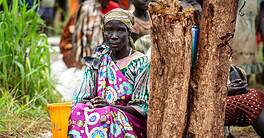Dr. Ziad Fariz, governor of Jordan’s central bank since 2012, talks about the refugee problem, recovery from the financial crisis, and how his country is keeping its financial system on an even keel.

Global Finance: Please give us your overall assessment of the economic climate in the Levant.
Ziad Fariz: The period following the global financial crisis and the Arab Spring has been a difficult one for the Levant countries. Aside from the fall in oil prices, security concerns and regional conflicts continue to take a toll on confidence, resulting in lower growth rates. This in turn makes it difficult for political leaders to address high unemployment and improve living standards.
Growth in the Levant countries is expected to remain relatively modest. Political instability, mainly in Syria and Iraq, as well as the flow of refugees to neighboring countries, continues to weigh. To strengthen their resilience and promote their economies, the Levant countries need to implement significant political and economic reforms.
GF: What economic impact can be expected from recent developments in Syria and Iraq?
Fariz: The situation in Syria and Iraq remains Jordan’s largest challenge. The wars have destabilized trade routes and decreased investments and tourism inflows. The arrival of 1.3 million Syrian refugees to Jordan has put unprecedented pressure on the kingdom’s infrastructure and public services.
The overall cost of the Syrian crisis on Jordan is estimated to reach $7.6 billion, according to the Jordanian Response Plan. Recently, however, there have been positive signs. The reopening of the Turaibil border between Jordan and Iraq was an important step for us, as exports to Iraq used to amount to around 20% of Jordan’s total exports.
GF: How are Jordanian banks, in particular, affected?
Fariz: The banks’ financial indicators have remained safe and sound. For example, the capital adequacy ratio for the banking sector has reached 17.5%, which is well over the minimum required ratio of 12% and is still considered the highest in the region.
Furthermore, banks enjoy a stable liquidity position. The liquidity ratio in total currencies, which the Central Bank requires banks to keep at a minimum of 100%, has reached 129.2% as of June 2017. The nonperforming loans also reached 4.4%, and their coverage ratio was 78.2%.
GF: How is the economy holding up?
Fariz: The combination of the global financial crisis of 2009, the Arab Spring, the energy crisis, and the closure of trade routes resulted in a decline in remittances and FDI, and increased food and oil prices. This was hard on the Jordanian economy, but we are resilient, and the economic outlook is expected to improve in the medium term.
To overcome these challenges, the government, supported by the IMF, adopted a national program for economic reform (2012-2015). This program was successful, and we have now launched a second phase (2016-2019) to promote stability and resilience, and to push for inclusive economic growth. This implies fiscal adjustment to reduce debt to safer levels, and structural reforms to enhance competitiveness, attract investment and boost job creation while at the same time fostering equity and good governance.
GF: What is the outlook for Jordan? What are your main areas of focus?
Fariz: Despite regional political instability and the refugee challenge, the outlook for the Jordanian economy remains positive. When compared to 2016, indicators available for 2017 show an important recovery in exports, tourism receipts, and remittances. The current account deficit is expected to decline gradually, supported by increased exports stemming in part from the agreement with the European Union and from the reopening of the Iraqi borders.
We also expect positive impact from ongoing structural and fiscal reforms. Economic growth is expected to reach 2.5% for 2017 and 2018 respectively. The government is fully committed to implementing Jordan’s economic reform program. In addition, the CBJ is concentrating its efforts to promote financial inclusion and facilitate access to credit.



